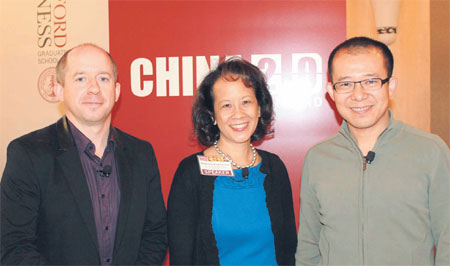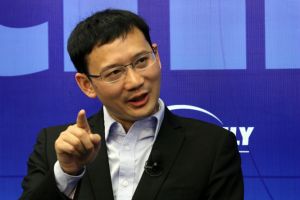Tencent aims to be Internet giant
Updated: 2013-10-18 11:21
By Zhang Qidong in San Francisco (China Daily USA)
|
||||||||
|
Tencent President Martin Lau takes a photo with fellow participants at the China 2.0 conference in San Francisco. Zhang Qidong / China Daily |
Jack Duan, who lives in the San Francisco Bay Area , used to pay AT&T $10 every month for texting. In January of this year, a friend in China introduced him to the mobile application WeChat that has free texting, instant voice messaging, photo transmission and blog publishing.
"The all-in-one free platform simply blew me away. I have to pay an average of 25 to 35 cents for every text message I send to China (via AT&T), so it's a great saving for someone like me, who needs to communicate with my friends in China on a daily basis, "said Duan, an entrepreneur who sells authentic made-in-the-USA products to Chinese consumers. "The small group chat enables my reading over what my friends recommend me to read, which keeps me well-informed."
WeChat, or Weixin in Chinese, was launched in 2011 as a mobile Internet strategy by Tencent, the third-largest Internet company in the world behind Google and Amazon by market capitalization. It became a phenomenal success in China with more than 100 million users just two years after its launch.
The company announced a market valuation of $101 billion in September, nine years after going public in 2004. Its online advertising revenue alone in 2012 reached $500 million, surpassing Google for the first time.
Whether WeChat will duplicate its success in the United States has yet to be proven by the company's US-based team.
At "China 2.0", a highly regarded China forum hosted by the Stanford Graduate School of Business on Oct 3, Tencent President Martin Lau said the development of WeChat in the US might be "difficult".
"Americans don't have a habit of replying texting instantly like the Chinese. The success we had in China and Southeast Asian countries might not be the same as the American market," said Lau.
Nevertheless, WeChat will be one of many services the company uses in its globalization effort, and the site's success has helped bolster Tencent's expansion into smartphone services.
With diverse services provided in social networks, web portals, e-commerce and multiplayer online games, Tencent's success in China has been the instant messenger Tencent QQ, the largest web portal named QQ.com. As of Dec 31, 2012, the active QQ users accounts for QQ IM were 798.2 million while its peak concurrent users reached 176.4 million.
According to Lau at China 2.0, Tencent leads the market in instant messenger, micro-chat, social networking, as an e-mail service provider, online games provider, portal and Wireless Application Protocol (WAP) portal by traffic and microblog platform.
While 75 percent of this year's second-quarter revenue came from value-added services, 9 percent was from advertising such as brand and performance displays, search and traffic.
With 30-plus employees at its US headquarter in Palo Alto, California, Tencent's globalization strategy is based on partnership.
"We invest in global leaders such as Epic Games and Activision, VNG, and Garena. We launch innovative products such as WeChat, which already has 100 million overseas registered accounts," said Lau.
Tencent is committed to enhancing its development and innovation capabilities while strengthening its nationwide branding for long-term development.
More than 50 percent of Tencent employees are R&D staff. It has obtained patents for technologies in various areas: instant messaging, e-commerce, online payment services, search engine, information security, gaming and many more.
Lau said what drives Tencent is its culture and vision: To be the most respected Internet company, with a mission to enhance people's quality of life through Internet service.
"The company's core values are integrity, proactive, collaboration and innovation, he explained.
With more than 20,000 employees - 60 percent of them engineers - Lau said the company is aggressively hiring new college graduates. The average age of Tencent employees is 28.
Following a strategy of one-stop online living, Tencent has established seven main business lines: IM (instant messaging) service, online media, wireless Internet value-added services, interactive entertainment service, Internet value-added service, e-commerce and online advertising service.
Tencent's development has profoundly influenced how hundreds of millions of Internet users communicate with one another as well as their lifestyles. It also offers a wider range of applications to the China's Internet industry.
"The second-quarter performance was driven by our online games and advertising businesses, resulting in a solid financial performance, including healthy profits and free cash flow growth on year-on-year basis. Our mobile and platform investments have enabled us to achieve deep mobile engagement, as demonstrated by rapidly increasing usage of our apps such as Mobile QQ, Mobile Qzone, Weixin, and WeChat on smart phones," said Ma Huateng, chairman and CEO of Tencent, in a recent press release.
"Our recent launch of the first mobile game integrated with Mobile QQ and Weixin generated widespread user excitement, exhibiting our platform strength, highly engaged social community and game execution capability. We will continue to increase our investment in mobile apps in order to reinforce our position in China, and to extend our presence to international markets through WeChat."
Ma, 42, an executive director and board chairman, oversees planning and management.
kellyzhang@chinadailyusa
(China Daily USA 10/18/2013 page10)
Most Viewed
Editor's Picks

|

|

|

|

|

|
Today's Top News
China has to brace for next dollar drama
Life of Pi artwork on display
No criminal charges in Asiana crash death: DA
US deal key to nabbing fugitives
Seattle high-tech summit talks 'green'
JPMorgan reaches $13b deal
China is reaching its tipping point
Beijing works to spur global development
US Weekly

|

|
















